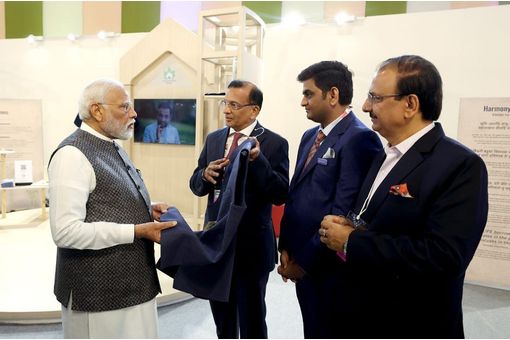Interviews
APTMA calls joint meeting of textile associations on RGST
29 Nov '10
3 min read
Chairman All Pakistan Textile Mills Association (APTMA) Gohar Ejaz has called a meeting of all textile associations on November 30 to evolve a joint strategy on imposition of Reformed General Sales Tax (RGST) on textile industry.
He said 85 percent of the textile products are exported in one or other form and any withdrawal of sales tax exemption on this largest exporting sector of the country would lead to more than Rs400 billion refunds stuck up with the Federal Board of Revenue (FBR) for an estimated collection of Rs25 billion Sales Tax on domestic consumption.
It may be noted that the APTMA has already urged the Federal government for continuity of zero rate tax regime for textile industry through a letter to the Standing Committee of National Assembly on Finance.
Gohar said the industry apprehends serious adverse implications of the withdrawal of exemption of zero-rating of the textile industry under the Reformed General Sales Tax (RGST).
He said 85 percent of textile produce is exported in one or the other form, with only 15 percent left for local consumption. Therefore, zero rating of the entire value chain from ginning to garmenting for the export and local supply is imperative to remain competitive in the international market, he added.
He said the petition is based on premise of peculiar fiber procurement processes of the spinning industry, causative liquidity crunch due to inadequate bank limits and unregistered sub-sectors of the textile value chain.
Chairman APTMA reminded that previous imposition of 15 percent sales tax on industry proved a failure and the government had no option but to zero rate the export-oriented industry after realizing that refunds were far in excess of collection of the sales tax.
He said the textile industry again fears a circular debt of Rs100 billion in the form of stuck up refunds with the withdrawal of tax exemption. According to him, unprecedented increase in cotton prices has already crippled textile industry. Therefore, it cannot sustain additional liquidity requirement of 15 percent under the RGST. Banks are reluctant to finance textile industry to procure swelling cotton prices and the SBP regulations do not allow financing of sales tax part, he added.
Gohar also pointed out obtaining adjustments/refunds against sales, as the spinning industry procures cotton in three months and consumes it during twelve months to manufacture and sell yarn to the weaving and knitting industry.
Chairman APTMA said the local supply of textiles and articles thereof should be zero rated in RGST in line with the current Sales Tax Act 1990. Further, he said, domestic supply of all inputs and services used in textile industry should be zero rated to avoid refunds and flying invoices as 80 percent of textile products are being exported in one form or the other.
He said 85 percent of the textile products are exported in one or other form and any withdrawal of sales tax exemption on this largest exporting sector of the country would lead to more than Rs400 billion refunds stuck up with the Federal Board of Revenue (FBR) for an estimated collection of Rs25 billion Sales Tax on domestic consumption.
It may be noted that the APTMA has already urged the Federal government for continuity of zero rate tax regime for textile industry through a letter to the Standing Committee of National Assembly on Finance.
Gohar said the industry apprehends serious adverse implications of the withdrawal of exemption of zero-rating of the textile industry under the Reformed General Sales Tax (RGST).
He said 85 percent of textile produce is exported in one or the other form, with only 15 percent left for local consumption. Therefore, zero rating of the entire value chain from ginning to garmenting for the export and local supply is imperative to remain competitive in the international market, he added.
He said the petition is based on premise of peculiar fiber procurement processes of the spinning industry, causative liquidity crunch due to inadequate bank limits and unregistered sub-sectors of the textile value chain.
Chairman APTMA reminded that previous imposition of 15 percent sales tax on industry proved a failure and the government had no option but to zero rate the export-oriented industry after realizing that refunds were far in excess of collection of the sales tax.
He said the textile industry again fears a circular debt of Rs100 billion in the form of stuck up refunds with the withdrawal of tax exemption. According to him, unprecedented increase in cotton prices has already crippled textile industry. Therefore, it cannot sustain additional liquidity requirement of 15 percent under the RGST. Banks are reluctant to finance textile industry to procure swelling cotton prices and the SBP regulations do not allow financing of sales tax part, he added.
Gohar also pointed out obtaining adjustments/refunds against sales, as the spinning industry procures cotton in three months and consumes it during twelve months to manufacture and sell yarn to the weaving and knitting industry.
Chairman APTMA said the local supply of textiles and articles thereof should be zero rated in RGST in line with the current Sales Tax Act 1990. Further, he said, domestic supply of all inputs and services used in textile industry should be zero rated to avoid refunds and flying invoices as 80 percent of textile products are being exported in one form or the other.
All Pakistan Textile Mills Association (APTMA)
Popular News
Leave your Comments
Editor’s Pick
































-Ltd..jpg?tr=w-120,h-60,c-at_max,cm-pad_resize,bg-ffffff)





.jpg?tr=w-120,h-60,c-at_max,cm-pad_resize,bg-ffffff)
.jpg?tr=w-120,h-60,c-at_max,cm-pad_resize,bg-ffffff)






